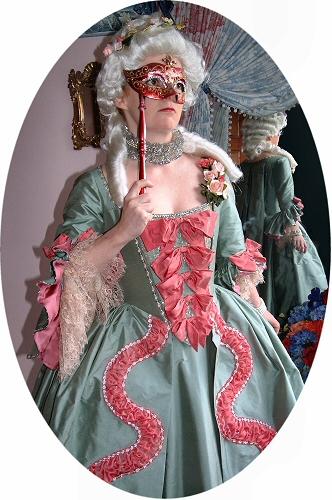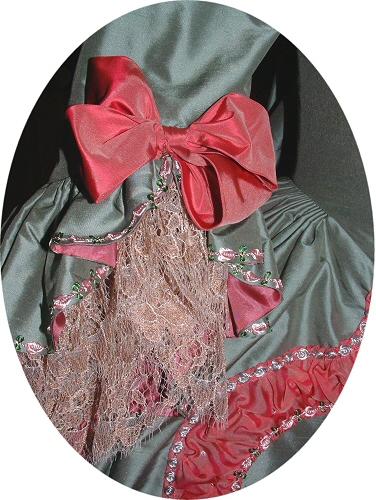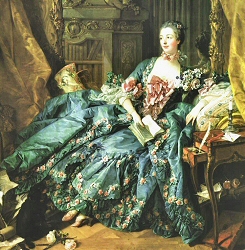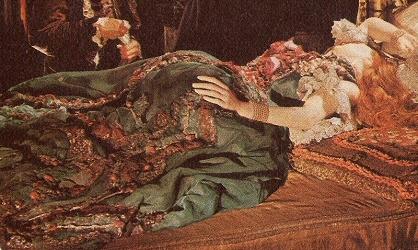 Introduction and
Introduction and
Information
(Home)
Contact Us
FAQ/contacts
Pre-Raphaelite
& Mediaeval
Contemporary
Bridal Gowns
Corsets/Stays
The William Morris
Collection
Classical Tutus
& Dance Costume
16th and 17th Century
18th and 19th Century
Ready-to-Wear
Accessories
Design Process
Sample Sale
Experience
File
|
|
| 18th
Century Sackback Gown |
"Alicia" |

|
|
The Sack dress was one of the most popular styles of gown worn during the mid to late eighteenth century. Suiting ladies of all shapes and sizes, it consists of a box pleated back falling from the shoulders to the floor. The bodice is cut separately and worn open at the front to reveal a decorated stomacher and petticoat. The entire gown can be worn over a fully boned corset or the bodice itself can be corseted instead. The gown shown is worn over small pocket hoops. It would be possible to create a larger more elaborate skirt over panniers.
|
 Inspiration for this gown came from the style and colouring of the Madame de Pompadour painting by Boucher and Madame Tussaud's portrait of Madame De Barry, Louis XV's last mistress (below). |
If you appreciate decoration, this is a style to enjoy!
Possibilities for embellishment are endless - trimmings can be applied to the edge of the bodice, skirt, petticoats and the stomacher. These can be frilled, pleated, ruched, beaded or embroidered and lace and ribbons were very popular at the time. It is not necessary to have a distinct contrast - self-coloured decoration is very effective. 
|
 |  |
|
This gown can be constructed in a multitude of fabrics and colour. This will probably depend on whether it is destined to be a wedding gown or a theatre costume. As shown the main gown is in a pale teal green regal silk dupion. The sleeve and stomacher bows are in "antique rose" silk taffeta and the ruched trim in a shot pink/gold chiffon. £3200 to make as shown including all fabrics. Price will vary according to fabrics and decoration used.
|
The artists at "Polyvore" have had great fun with these images, shown below, producing many variations on
the Marie Antoinette theme: great fun! |
| Please visit "Polyvore" for artist credits and links to all items shown; search on "Rossetti". |
This design can be varied and individualised
to each made-to-measure order. |
Copyright © 2005 Theresa Blake. All Rights Reserved.
|